This article was co-authored by Laura Marusinec, MD. Dr. Marusinec is a board certified Pediatrician at the Children's Hospital of Wisconsin, where she is on the Clinical Practice Council. She received her M.D. from the Medical College of Wisconsin School of Medicine in 1995 and completed her residency at the Medical College of Wisconsin in Pediatrics in 1998. She is a member of the American Medical Writers Association and the Society for Pediatric Urgent Care.
There are 19 references cited in this article, which can be found at the bottom of the page.
wikiHow marks an article as reader-approved once it receives enough positive feedback. This article received 14 testimonials and 87% of readers who voted found it helpful, earning it our reader-approved status.
This article has been viewed 309,846 times.
The tonsils are glands found at the back of the throat. Sore throats, which can be quite painful, are usually a result of inflamed or irritated tonsils. This can be due to post-nasal drip from allergies, a virus like the common cold or flu, or a bacterial infection like streptococcus. Depending on the cause, there are a number of medical and natural treatments to soothe and heal a sore throat, as well as best practices to ensure you will get better as soon as possible.
Steps
Taking Medicine
-
1Use an over-the-counter anti-inflammatory. Medicines like aspirin, Aleve (naproxen sodium), Advil or Motrin (both ibuprofen) will reduce inflammation and pain. They will also help provide relief if you have a fever accompanying your sore throat.
- WARNING: Do not give aspirin to children. It can cause Reye syndrome – sudden brain damage and liver problems – in children with chicken pox or the flu.[1]
-
2Try an over-the-counter pain medication. Acetaminophen will not reduce inflammation, but it can help to reduce the pain associated with sore tonsils. Adults should not take more than 3 grams (0.11 oz) of acetaminophen a day. See the packaging or talk to your child's doctor for safe amounts for children.[2]Advertisement
-
3Swallow a spoonful of cough syrup. Even if you don’t have a cough, these syrups will coat your throat and contain soothing pain relievers. If you don’t want to use a cough syrup, honey will also coat your throat and provide relief.
-
4Try an antihistamine. There are a wide variety of over-the-counter antihistamines – drugs that reduce allergic symptoms by blocking histamine receptors. If your sore tonsils are due to post-nasal drip from allergies, an antihistamine may cure your symptoms.[3]
-
5Take antibiotics for strep throat. The streptococcus (bacterial infection) is the cause of approximately 5% to 15% of sore throats in adults and is more common in children 5 to 15. It may be accompanied by a runny nose, but unlike a cold, also results in severe throat pain with enlarged tonsils, often with exudate (pus), swollen glands in the neck, headache, and fever (over 100.4 degrees F). Your doctor will diagnose strep throat with a throat swab. With antibiotics, you will feel better within a couple of days.[4]
- Always finish all your antibiotics, even if you feel better before they are done. Taking the full course of will kill all of the bacteria and prevent it from developing resistance to the antibiotic.
Using Natural Remedies
-
1
-
2
-
3Suck on hard candies. Sucking on candies produces saliva, which keeps the throat moist.[9] Anti-inflammatory lozenges and sprays should be used sparingly, for while they may dull throat pain temporarily, excessive use can make your sore throat worse.[10]
-
4Eat a spoonful of honey. Honey will coat and soothe your throat, and it also contains anti-bacterial agents. Also consider adding it to warm drinks to improve their flavor and efficacy.[13]
- Warning: Do not give honey to children under 1 year of age, as it can contain spores that result in infant botulism, a life-threatening disease.[14]
-
5Drink warm liquids. Lemon tea or tea with honey can help to soothe your throat.[15] In addition, you might want to try one of these warm drinks:
- Chamomile Tea – Chamomile contains anti-bacterial agents and natural pain-killers that will soothe your throat.[16]
- Apple Cider Vinegar – The vinegar helps to kill germs and soothes the throat. Mix 1 tablespoon (14.8 ml) with 1 tablespoon of honey and a cup of warm water. It has a strong flavor, so gargle and spit if you don’t wish to swallow it.[17]
- Steeped Marshmallow Root, Licorice Root, or Elm Bark – These substances are all demulcents, agents that relieve inflammation of mucus membranes like the tonsils by help to coating them with a protective film.[18] You can buy teas with these ingredients or make your own. Pour 1 cup of boiling water over 1 tablespoon (14.8 ml) of dried root or bark and let it steep for 30 to 60 minutes. Strain and drink.[19]
- Ginger – Ginger contains anti-inflammatory and anti-bacterial agents. Start with a 2-inch piece of ginger root. Peel it, cut it into small pieces, and crush it. Add the crushed ginger to 2 cups of boiling water and boil for 3-5 minutes. Drink when cool enough.[20]
-
6Make some chicken soup. The sodium has anti-inflammatory properties. Chicken soup is also a good source of nutrients, which will help you fight off the disease causing your sore tonsils.
-
7Eat a scoop of ice cream. You need nutrients to fight disease, and if you’re throat hurts to much to eat, ice cream is one solution. It’s easy to swallow, and the cold will soothe your throat.[21]
-
8Suck on garlic. Garlic contains allicin, a compound that kills bacteria and also has anti-viral properties.[22] So while sucking on it won’t do any favors for your breath, it can destroy the germs that are causing your sore throat.
-
9Chew on cloves. Cloves contain eugenol, a natural painkiller and anti-bacterial agent. Put one or more cloves in your mouth, suck on them until they are soft, and then chew like gum. Cloves are safe to swallow.[23]
Considering Other Treatments
-
1Rest. Few remedies are more effective than resting in order to allow your body to recover. Not getting enough sleep, or continuing to work or go to school while sick can make your illness worse.[24]
-
2Turn on a cool mist humidifier while you sleep. This will help to moisten and soothe your throat. It will also thin any mucus that may be causing discomfort.[25]
-
3Steam up your bathroom. Run the shower to steam up your bathroom and sit in the steam for 5 to 10 minutes. The warm, moist air will help to soothe your throat.
-
4Call your doctor if your sore throat persists for more than 24-48 hours. Contact your doctor earlier if you or your child have swollen glands, a fever (above 100.4 degrees F), and severe throat pain[26] or if you have been around someone with strep throat and have a sore throat.
- Consult your doctor if you have strep throat and are getting worse or not better after 2 days of antibiotics or if you have new symptoms such as a rash, swollen joints, decreased or dark colored urine, or chest pain or trouble breathing.
-
5Discuss having your child’s tonsils removed if he or she has frequent tonsillitis or strep throat. Children with large tonsils are more prone to sore throats and ear infections. If your child has frequent tonsil infections – 7 or more times in 1 year, or 5 or more times over 2 years – you should talk to your doctor about a possible tonsillectomy – a low-risk, out-patient procedure to remove the tonsils.[27]
References
- ↑ https://www.arnoldpalmerhospital.com/content-hub/why-you-shouldnt-give-aspirin-to-your-child
- ↑ http://www.nlm.nih.gov/medlineplus/ency/article/002123.htm
- ↑ http://www.med.umich.edu/1info/FHP/practiceguides/pharyngitis/pharyn.pdf
- ↑ http://newsinhealth.nih.gov/issue/mar2013/feature2
- ↑ http://newsinhealth.nih.gov/issue/mar2013/feature2
- ↑ https://globalnews.ca/news/3901223/how-to-soothe-a-sore-throat/
- ↑ https://www.pennmedicine.org/updates/blogs/health-and-wellness/2018/february/sore-throat
- ↑ https://pubmed.ncbi.nlm.nih.gov/12017929/
- ↑ http://newsinhealth.nih.gov/issue/mar2013/feature2
- ↑ http://www.nlm.nih.gov/medlineplus/ency/article/001392.htm
- ↑ https://www.drjuliewei.com/blogs/news/top-7-choking-hazards-for-children
- ↑ https://pediaclinic.net/Tonsil-Infection-Viral
- ↑ https://www.cdc.gov/antibiotic-use/sore-throat.html
- ↑ https://www.nhs.uk/conditions/baby/weaning-and-feeding/foods-to-avoid-giving-babies-and-young-children/
- ↑ http://www.nlm.nih.gov/medlineplus/ency/article/000639.htm
- ↑ https://www.pennmedicine.org/updates/blogs/health-and-wellness/2018/february/sore-throat
- ↑ http://everydayroots.com/sore-throat-remedies
- ↑ http://www.ncbi.nlm.nih.gov/pmc/articles/PMC200788/
- ↑ http://everydayroots.com/sore-throat-remedies
- ↑ http://everydayroots.com/sore-throat-remedies
- ↑ http://www.med.umich.edu/1info/FHP/practiceguides/pharyngitis/pharyn.pdf
- ↑ https://www.manipalhospitals.com/blog/9-natural-remedies-for-sore-throats
- ↑ http://everydayroots.com/sore-throat-remedies
- ↑ https://medlineplus.gov/tonsillitis.html
- ↑ https://familydoctor.org/condition/tonsillitis/
- ↑ http://newsinhealth.nih.gov/issue/mar2013/feature2
- ↑ http://www.nlm.nih.gov/medlineplus/ency/article/003013.htm
About This Article
To get rid of sore tonsils, take an anti-inflammatory medicine, such as aspirin, Aleve, or Advil, to reduce pain and swelling. Alternatively, soothe your throat with some honey or cough syrup, or try eating a bowl of ice cream. You should also drink plenty of fluids, like warm teas and clear soups, to keep your throat moist. Additionally, try gargling with saltwater once an hour to reduce swelling and bacteria growth. To learn how to use steam to soothe your sore tonsils, keep reading!
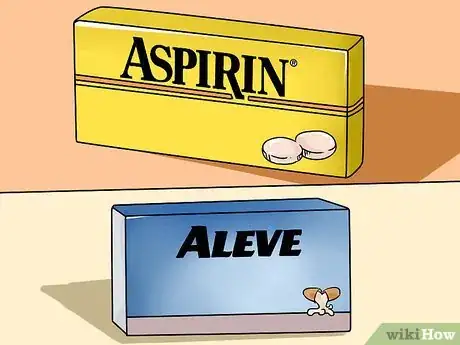
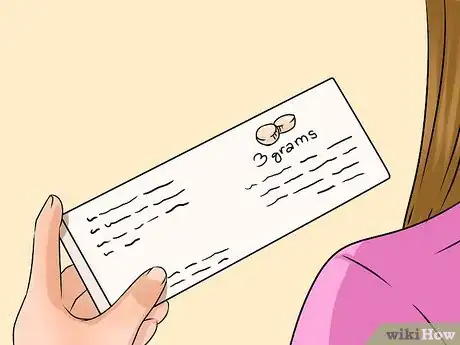
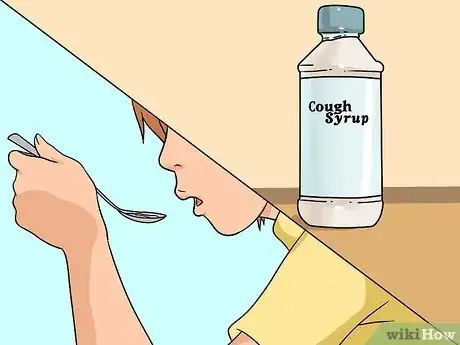
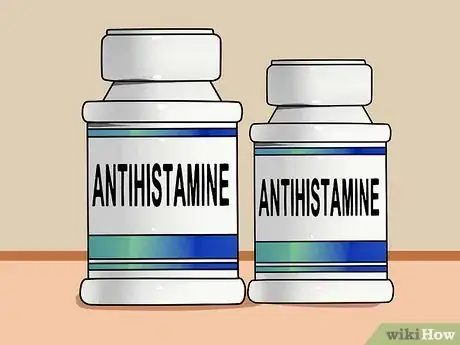


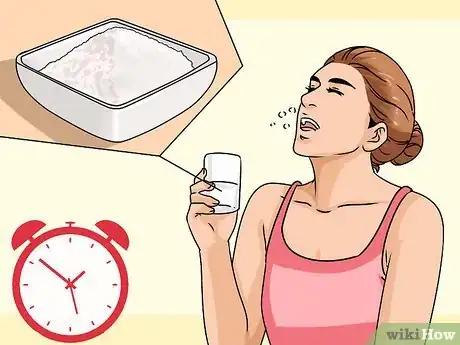
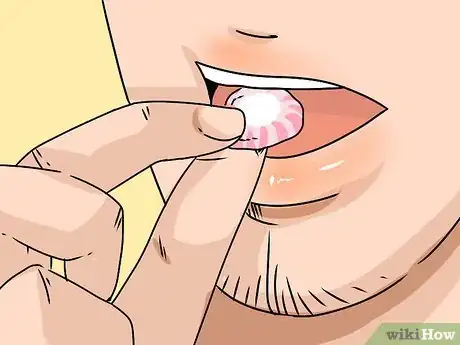
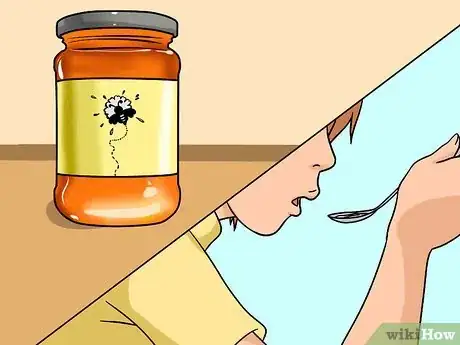



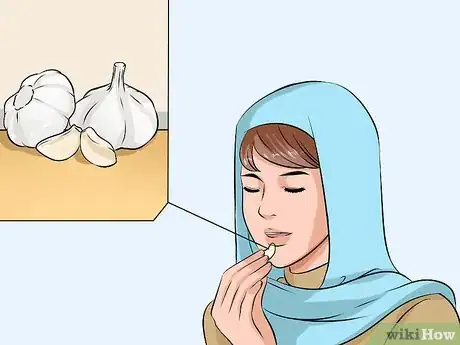


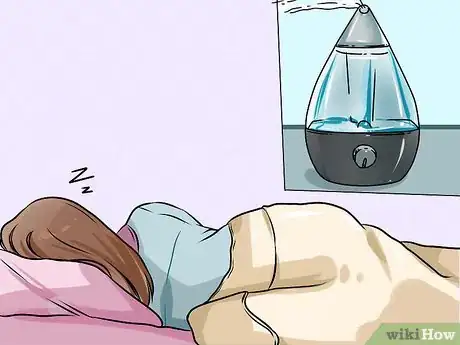
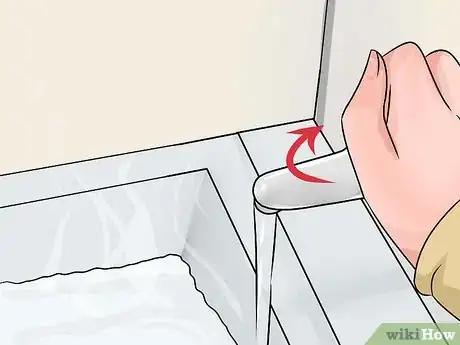





-Step-17.webp)

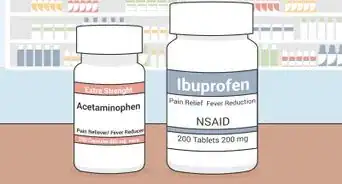

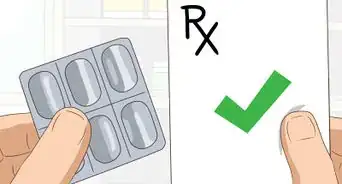


















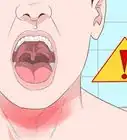
-Step-17.webp)



































Medical Disclaimer
The content of this article is not intended to be a substitute for professional medical advice, examination, diagnosis, or treatment. You should always contact your doctor or other qualified healthcare professional before starting, changing, or stopping any kind of health treatment.
Read More...